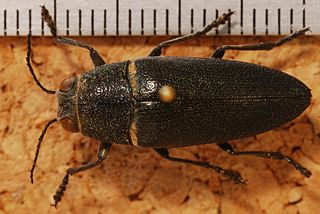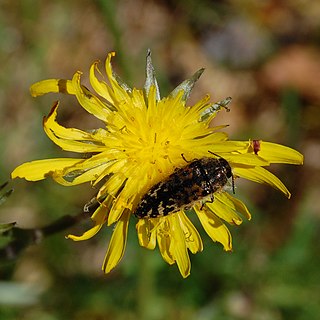Trachykele blondeli is a species in the family Buprestidae, in the order Coleoptera ("beetles"). Common names include "western cedar borer", "powder worm beetle", and "western red cedar borer". The distribution range of Trachykele blondeli includes Central America and North America.
Sphenoptera jugoslavica is a species in the family Buprestidae, in the order Coleoptera ("beetles"). A common name for Sphenoptera jugoslavica is "bronze knapweed root borer". The distribution range of Sphenoptera jugoslavica includes Europe & Northern Asia and North America.
Agrilus gillespiensis is a species in the family Buprestidae, in the order Coleoptera ("beetles"). It is found in North America.
Chalcophora fortis is a species in the family Buprestidae, in the order Coleoptera ("beetles"). It is found in North America.
Agrilus mimosae is a species of metallic wood-boring beetle in the family Buprestidae. The distribution range of Agrilus mimosae includes Central America and North America.

Hippomelas planicauda is a species in the family Buprestidae, in the order Coleoptera ("beetles"). The distribution range of Hippomelas planicauda includes Central America and North America.
Acmaeodera rubrocuprea is a species in the family Buprestidae, in the suborder Polyphaga . The distribution range of Acmaeodera rubrocuprea includes Central America and North America.
Agrilus limpiae is a species in the family Buprestidae, in the suborder Polyphaga . It is found in North America.
Texania campestris is a species in the family Buprestidae, in the suborder Polyphaga. The species is known generally as the "hardwood heartwood buprestid". It is found in North America.
Agrilus latifrons is a species of metallic wood-boring beetles in the family Buprestidae. It is found in Central America and North America.
Hesperorhipis hyperbola is a species of metallic wood-boring beetles in the family Buprestidae. It is found in North America.

Agrilini is a tribe of metallic wood-boring beetles in the family Buprestidae. There are at least 180 described species in Agrilini.
Dicercini is a tribe of metallic wood-boring beetles in the family Buprestidae. There are at least 40 described species in Dicercini.

Buprestis langii is a species of metallic wood-boring beetles in the family Buprestidae. It is found in North America.
Buprestini is a tribe of metallic wood-boring beetles in the family Buprestidae. There are at least 30 described species in Buprestini.
Agrilus rubroniger is a species of metallic wood-boring beetles in the family Buprestidae. It is found in North America.

Agrilaxia flavimana is a species of metallic wood-boring beetle in the family Buprestidae. It is found in Central America and North America.

Acmaeodera hepburnii is a species of metallic wood-boring beetle in the family Buprestidae. It is found in Central America and North America.

Chrysobothrini is a tribe of metallic wood-boring beetles in the family Buprestidae. There are at least 3 genera and 140 described species in Chrysobothrini.

Melanophilini is a tribe of metallic wood-boring beetles in the family Buprestidae. There are at least 4 genera and 20 described species in Melanophilini.






